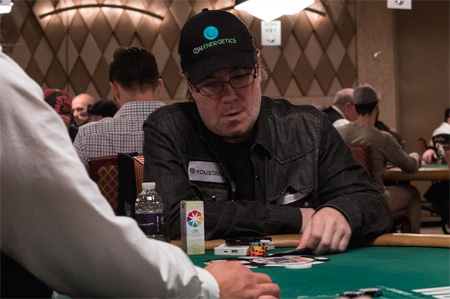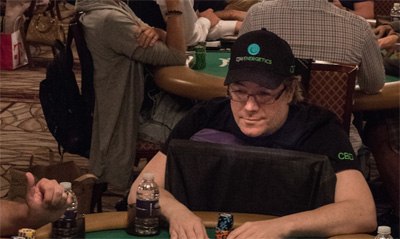2006 WSOP Champion Jamie Gold: “Poker’s Back and So Am I”

By Alexander Villegas
There's no template for Main Event champions.
Some take their millions and vanish while others linger for as long as they can. Some keep winning, others don't.
A few champions successfully defend their titles. Some champions become intrinsically linked to poker itself.
They catalyze change, they mark monumental turning points or they cement themselves as a poker archetype.
No One Could Stop Him

Stu Ungar embodied the tragic brilliance of a genius professional gambler. Ungar won back-to-back WSOP Main Events in 1980 and 1981, but developed a crippling cocaine habit around that same time.
After falling into a pit of sports betting and drugs, Ungar resurfaced in 1997 and won the Main Event again. The victory earned him the nickname of Comeback Kid, but it was a final flash of brilliance rather than a comeback.
Ungar overdosed and died in a Motel 6 the following year. He was completely broke.
Other champions mark eras. Chris Moneymaker's 2003 victory sparked a blaze of online poker. Moneymaker was an accountant from Tennessee that qualified to the Main Event for just $39 and ended up winning $2.5 million.
Moneymaker's final opponent was even an old school Vegas pro with an unlit cigarette in his mouth and a slightly unbuttoned shirt.
Poker exploded. Anyone could be the next Moneymaker. The 2003 Main Event had 839 entrants and by the time Jamie Gold took the title in 2006, the field had grown to 8,773 players.
Poker was a wild-growing parasitic weed that secreted money. Nothing could stop it. In 2006, no one could stop Gold either.
The Unstoppable Jamie Gold
“I was never all in since Day 1,” Gold said. “I believed I was going to win, but I didn’t feel like I really had it until Day 4.
"I had such a massive chip lead that whatever table I went to, I had more than the entire table.
“You know, when you’re a chip leader for eight days straight and you’re never at risk, there’s a certain point where think, ‘Wow, I’m really going to win this thing.'”
Aside from his stack, Gold also had a dominating mental game. The Hollywood agent consistently talked players into folding the best hand and convinced them to call with the worst.
“I had a great run of cards, I was playing my best at the time and I was doing something people weren’t use to. You know, the talking,” Gold said.
“It was the perfect storm.”
That storm also gave Gold the largest Main Event payout in history: $12 million.
Gold said he’d been up for 24 hours when he won and then stayed up for another 24 hours celebrating with friends and family.
“We drank way too much,” Gold said. “I remember going into CNN the next day and being intoxicated and telling them, ‘Listen, I should not be doing this interview, why don't we wait a day.’”
CNN insisted on doing the interview anyways and Gold pulled it together.
“That was by far the peak of everything in poker,” Gold said.
The Downswing
Then things kind of went to shit. Gold stopped playing poker after his win to spend time with his father, who was suffering from Lou Gehrig’s disease. Gold’s father died that December.
"We knew that he was in the last short period of his life," Gold said. I spent as much time as I could with him. The last thing I was thinking about was playing poker."
On top of that, Gold faced legal trouble over his winnings. Crispin Leyser said he’d made a deal with Gold for half his winnings and Gold was refusing to pay. Leyser sued Gold and the two eventually settled out of court.
Online poker also started to suffer after Gold’s win. Congress passed the Unlawful Internet Gambling Enforcement Act in October of 2006 and that laid the groundwork for the FBI investigation that led to Black Friday.
That case led to a settlement too, but that one had a $731 million price tag.
Both Gold and online poker seemed to vanish from the United States. There’s been inklings of their return in the past few years though. Nevada, New Jersey and Delaware legalized online poker and more states are expected to follow.
Gold: "I'm definitely back and I take poker very seriously."

“It's starting to come back,” Gold said. “People think that poker has gone steadily down, but that's not true. There's more people playing and entering poker tournaments.
“You just don't see it on television as much because there's the lack of sponsorship because of the lack of online sites.”
Gold and silver
Now, a decade after his historic victory, Gold is working his way back to the poker spotlight. He made a WSOP final table last year and finished 2nd the Los Angeles WSOP Circuit Event this March.
“I’m definitely back and I take poker very seriously,” Gold said. “I’d been away for about six years and the game changes every year or two.
“So I retrained and studied with some great young players in the same way I trained in the first place.”
One aspect of the game that's changed is table talk. The way Gold would talk about his hands to psych out his opponents isn’t allowed anymore, but Gold says he still has his ways to be a psychological opponent.
He thinks it's a part of the game that's also going to make a comeback.
It's not the just the game, Gold's changed too. Before 2006, all he wanted to do was win the Main Event.
“But I did that on my first shot,” Gold said.
What's a poker player to do after that?
Charity and Legacy
“It's never been about winning as many tournaments as I can,” Gold said.
“For me it's been about how much money I could raise. How many people I could help. How many people I could inspire to help the world.”
Gold has participated in and helped organize a number of charity poker tournaments since his Main Event win. Gold, who still works in marketing in publicity, also uses poker to promote the businesses he’s representing.
Gold says it’s silly to predict the future, but he hopes to play more after he retires. He just wants get better and do well in the events he plays in.
But no matter how good he gets, Gold says he might never be a match for the mythical 2006 version Jamie Gold.
“He was running so good I don't think I could beat him even though my game is so much better now,” Gold said.
“He was in the zone and just running amazing. It's really lucky to get it in with the best of it and not get unlucky.
“Sometimes there's just nothing you can do, sometimes there's just no way you're going to beat somebody.
“The stars were aligned for him back then.”
Some think the game itself can never match the golden era of 2006, but it won’t stop them from playing.
Headlines
- Super Bowl Weekend Charity Poker Tournaments In Las Vegas Bring Out the Stars
- Variety Children’s Charity Poker
- Jamie Gold Returns to Poker After Dark for “Golden Nights” Week
- Jamie Gold is Back! But Was He Ever Gone?
- Variety Charity Poker Night – 2018
- Great Jamie Gold Fold
- Variety Charity Poker Night
- Top Poker Pros Talk Poker Strategy and Politics
- A Conversation with Jamie Gold – Winner of the Biggest WSOP Main Event Ever
- Jamie Gold And Adrian Paul To Host The PEACE Fund’s Annual Celebrity Poker Tournament
- WSOP Main Event Champ Jamie Gold – Tipsy Talk
- Yasiel Puig’s Wild Horse Foundation Charity Poker Tournament
- Linkin Park And Steve Aoki Host Music For Relief Poker Tournament
- Giving Back Fund Holds 8th annual Big Game Big Give Event at Super Bowl
- Giving Back Fund 8th Annual Big Game Big Give
- February 4th! Jamie Hosts “Big Game – Big Give”
- ESPN – Poker is lacking the heroes and villains it so desperately needs
- Real Story with Gretchen Carlson
- Access Hollywood Segment from the Variety Charity Poker Tournament
- Variety Charity Poker Night – July 27th
- The Variety Charity Poker & Casino Night!
- Casino World Magazine July 2016
- One Step Closer Foundation Celebrity Poker Tournament
- 2006 WSOP Champion Jamie Gold: “Poker’s Back and So Am I”
- Wall Street is wagering that the ‘great dollar correction’ is just beginning
- Music for Relief Poker Tournament Benefit
- Jamie Gold takes Second in the Bicycle Casino WSOP Circuit Main Event
- Poker for Hope 2016
- A Closer Look at WSOP Champion Jamie Gold’s Charity Poker Work
- USA Today – Antonio Esfandiari beats Jamie Gold for WSOP Circuit gold
- Jose Canseco, Jamie Gold & A YouStake Showdown
- WSOP Day 35: Jamie Gold and Anthony Zinno in Prime Position to Capture WSOP Bracelets
- Jamie Gold Makes Final Table In $1,500 No-Limit Hold’em Event At 2015 World Series Of Poker
- 2006 WSOP Champ Jamie Gold Thinks “Maybe I Can Compete Again” and Talks YouStake
- An Evening with Dr. Mehmet Oz to benefit Kidsanctuary
- The One Step Closer Foundation’s Seventh Annual All-In for Cerebral Palsy (CP) Celebrity Poker Tournament
- 7th Annual All In for CP Celebirty Poker Tournament
- Go All-In for a Good Cause
- Her House of Cards
- High Stakes Heroes : Poker Player Magazine
- Good instincts can overcome bad cards
- ESPN 106.3FM Interview
- Auction to Benefit Leukemia & Lymphoma Society
- Wonderwall Listomania – Celebrity Poker Stars
- Can Poker Save the World?
- SI Vault – Jamie Gold
- Jamie Gold – “The Philanthropist”
